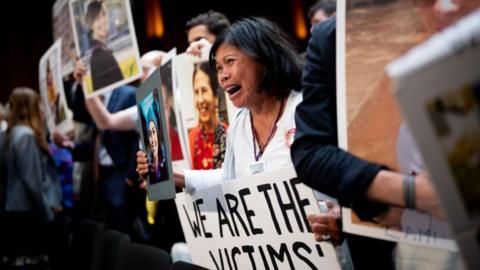The Department of Justice said it was reviewing the decision. Boeing did not immediately comment.
In his decision, Judge O'Connor said the government's previous years of overseeing the firm had "failed".
"At this point, the public interest requires the Court to step in," he wrote.
He said the proposed agreement did not require Boeing to comply with the monitor's recommendations and gave the company a say in selecting a candidate.
Those issues had also been raised by some families of those killed on the flights, who had criticised it as a "sweetheart" arrangement that did not properly hold the firm to account for the deaths.
Judge O'Connor also focused on the deal's requirements that race be considered when hiring the monitor, which he said would undermine confidence in the pick.
He said he was concerned with the "shifting and contradictory explanations of how the plea agreement's diversity-and-inclusion provision will... operate".
"In a case of this magnitude, it is in the utmost interest of justice that the public is confident this monitor selection is done based solely on competency," he wrote.
"The parties' DEI efforts only serve to undermine this confidence in the government and Boeing's ethics and anti-fraud efforts."
Ike and Susan Riffel of California, who lost their two sons, Melvin and Bennett, said the judge had done "the right thing" in rejecting the proposed agreement.
"This deal didn't hold anyone accountable for the deaths of 346 people and did nothing to protect the flying public," they said in a statement supplied by their lawyer.
They said they hoped the ruling would pave the way for "real justice".
